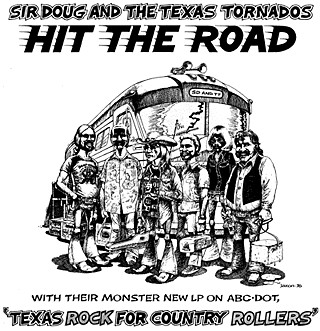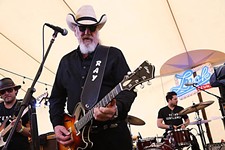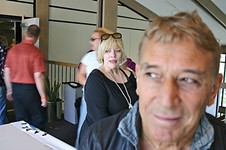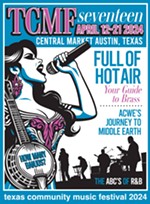Groover's Paradise
Places You Never Heard Of
By Ed Ward, Fri., Nov. 26, 1999

In March, 1970, I was the new kid at Rolling Stone, a 21-year-old college dropout ready to please, when editor/publisher Jann Wenner called me into his office. "Do you like the Sir Douglas Quintet?" he asked. Mendocino had been one of my favorite albums for a long time, and word had it another was one ready, so I said yes. "Great," said Wenner. "I'd like you to go talk to Doug Sahm, find out what he's up to. I understand he's been hanging with Dylan recently; maybe you can find something out about that." Armed with an address in Marin County just north of San Francisco, I took off. I had no idea what to expect, but I harbored hopes that Dylan might be there, because then I'd have scoop. He wasn't, but this skinny, stringy-haired guy with granny glasses appeared in the living room with a joint as thick as my thumb, twigs sticking out of each end.
"Rolling Stone, eh?" he grinned. "I like that magazine. It's soulful."
He said it without the "l" -- "sou'ful."
"Here, let's smoke this."
But it's got twigs in there --
"Yeah, ain't that far out."
Except it came out as "for aout." He lowered his voice.
"Dylan rolls 'em like that."
So we lit up, and here my memory completely fails me, except that the next couple of hours were total chaos. Sahm talked nonstop, although not about anything I could write about: cosmic theory, astrology (he'd determined early on that we were both Scorpios, with birthdays just a few days apart), good vibes, and probably a lot of other stuff.
The next day, I slunk into the office, only to have Wenner call me into his den right away.
"So," he said with his sternest possible expression, "did you get the story?"
I mumbled and stammered, and may have started sweating. Wenner's gaze drilled into me. Finally, he couldn't hold it any longer and started to laugh. And kept laughing.
"He got you, too, huh?" he finally gasped.
In the end, nobody did the story.
Doug liked me, so we kept in touch, which was hard to do, because he never seemed to stay in one place for very long. But he had my phone number, so he'd call, and I'd always go out to see if I could get a story this time. Doug would rave about wherever he was living, saying why it was better than where he'd just been: Vancouver, Oslo, New York, Marin County, all were paradises. Or not. The oddest Eden had to have been Prunedale.
"Hey, man," raved Doug over the phone, "you gotta come down here and check this shit out. This is, like, Texas in California, man. It's John Steinbeck country. It's got a real sou'ful vibe, and I've found this great new band. They're called Louie & the Lovers."
Enlisting the help of a photographer friend, we headed down toward Monterey, turning at Salinas Valley, and eventually winding up in Prunedale, where, Doug had neglected to tell us, there was a shooting war going on; part of César Chavez's United Farmworkers strike against the lettuce growers.
"Yeah, man," he said waving his arms around, "it's totally for aout: The growers are tryin' to stop the strike, but the people here are all too much into it. Man, the band works in the fields by day, and they play dances for Chavez's people at night."
Pretty soon, Louie Ortega and a couple of the other guys showed up. Only Louie spoke much English, but Doug slapped on a tape of the album he'd produced and was trying to sell to a label. The title track, "Rise," was magnificent, and it was immediately apparent what Doug saw in the band: a purer mixture of Chicano pop and rock than the Quintet had ever achieved -- fronted by a guy with teen-idol good looks. I was sold.
Not long afterward, so was Epic Records, which released the album at a time when the three-minute pop song was distinctly out of fashion. Doug had hoped "Rise" would take off as an anthem for the farmworkers and their Anglo supporters, but striking farmworkers don't buy albums, and Epic was left with a dud on their hands. A great dud, but a dud.
Doug didn't help, of course, by showing up to their showcase gigs: At the Keystone Berkeley, Louie and the guys did a great set, and then Doug came on with his T-Bone Walker guitar, cranked it up to 11, and played a psychedelic freakout that had the band giving each other odd looks and the crowd, hands on ears, running for the exit.
I remained a fan because the albums were good, but it was a lonely crusade; Doug's penchant for under-rehearsed bands and unplanned sets, seemingly played without a sound check, meant that few newbies lasted through an evening. He could be just as difficult in the studio. I remember when Atlantic put out the Doug Sahm and Friends album, with everyone from Bob Dylan to Dr. John to Flaco Jimenez's debut in the Anglo world on it. Jerry Wexler, who'd produced it, was a frequent San Francisco visitor in those days, and he'd call his press friends together at his hotel, play us some new releases, and then take us out for epic Chinese meals.
"But Jerry," I asked one time, eyeing the swag he'd just handed out to us, "didn't you just do a Doug Sahm album?"
"Oh, would you like one?" he asked, pulling it out of his luggage. "It's a very good record."
He paused, getting a soulful Jewish-guy-outwitted-by-a-hick look on his face.
"I'll never do another one with him ever again." And he clammed up.
Doug and I became Texas converts at about the same time, with the big difference being that he got to move back and I had to wait a few more years before getting there. He always had a knack for over-publicizing whatever place he was enthusiastic about at the moment, and I remember asking him if Groover's Paradise, which he'd just released, wasn't a bit much.
"Yeah, man, Austin's over. You ever been to Vancouver? It's for aout!"
I wasn't aware he'd moved, but he kept doing it. Anybody out there remember "Malmo Girls"? I think that was the title. And last year, hearing heard him complain about the traffic congestion and the loss of Austin's soul, I asked him about his new song "Get a Life," which urged people to move to Austin and get a life.
"Aw, hell, let the mayor and the City Council deal with it," he said.
But that was Doug: constantly spinning off enthusiasm for places and people you'd never heard of, making your head spin with non sequiturs and nonlinear leaps that made perfect sense to him, a Chicano one day, a honky bluesman the next, a missing person the day after that.
It is to Doug Sahm that I owe my discovery of San Antonio's West Side R&B scene in the Sixties, several funky taquerias on Austin's Eastside, Huey P. Meaux, and of course, many hours of fine listening. I've even forgiven him telling me he was Lebanese, something he said with a perfectly straight face and I wrote into some liner notes and is still being reported as fact. Sahm, as any beer drinker who's ever read the bottom of an empty glass in Germany knows, is a German name.
It's been a hard week, realizing I'll never see him again, get put on or frustrated by him again, or most particularly, hear him announce another South by Southwest softball playoff game again. In his own words, he was sou'ful and for aout. ![]()








